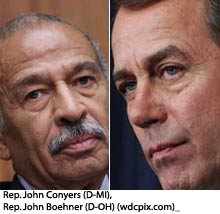Here's one other key aspect of the Rove-Miers testimony agreement that's worth noting...
The agreement declares that the famous "Scudder memo" will be made available "for Committee review only". In other words, the committee won't get to keep a copy, nor will it be able to release the memo publicly.
That seems at first like a significant concession.
The Scudder memo, to refresh your memories, appears to be a key piece of evidence in the effort to get to the bottom of the White House's role in the firings. Michael Scudder, an associate White House counsel, was tasked by White House staff with conducting an internal inquiry fully documenting the White House's involvement in the affair. He interviewed numerous White House and DOJ officials, including Rove. In their report on the firings released last year, Justice Department investigators identified the Scudder memo as one of the most crucial documents to which they lacked access, that might have helped them uncover the truth.
But it's not quite that simple. In an emailed statement to TPMmuckraker, a committee source explained why the committee settled for being able to review the memo only:
The Scudder memo was identified by OIG/OPR as a critical document even they could not get, and we would not have accepted a settlement that did not get us full use of the document in the interviews. At the same time, we do respect the need for White House lawyers to investigate rising controversies, and so we think the agreement works a fair compromise that won't limit our investigation or unduly burden any future Administration.
In other words, it sounds like one or both of the Bush and Obama White Houses were concerned, perhaps legitimately, about maintaining the ability to conduct internal reviews of controversial issues with the confidence that the results will remain confidential. And the committee felt willing to compromise on that point, as long as it was given adequate time to review the memo before it questioned Rove and Miers.
And of course, when transcripts of the testimony are released, we'll likely learn the key facts included in the memo anyway-- since they'll presumably be included in the committee's questioning and in the witnesses' responses.
On the related subject of the Obama White House's role in the deal, here's the cover letter that went with the agreement, written by Obama White House counsel Gregory Craig, and sent to Judiciary chair John Conyers, and President Bush's lawyer, Emmet Flood.
The letter, which notes that "both the Bush administration and the House Judiciary Committee have confirmed to me orally and in writing that they have accepted the terms of the enclosed Agreement."
In other words, as recent reports have suggested, the Obama White House was intimately involved in shaping this agreement -- a fact that would appear to explain the concern for maintaining the White House's ongoing ability to conduct confidential internal inquiries.

















 Conyers To Boehner: Enough With The Voter Fraud!
Conyers To Boehner: Enough With The Voter Fraud!


